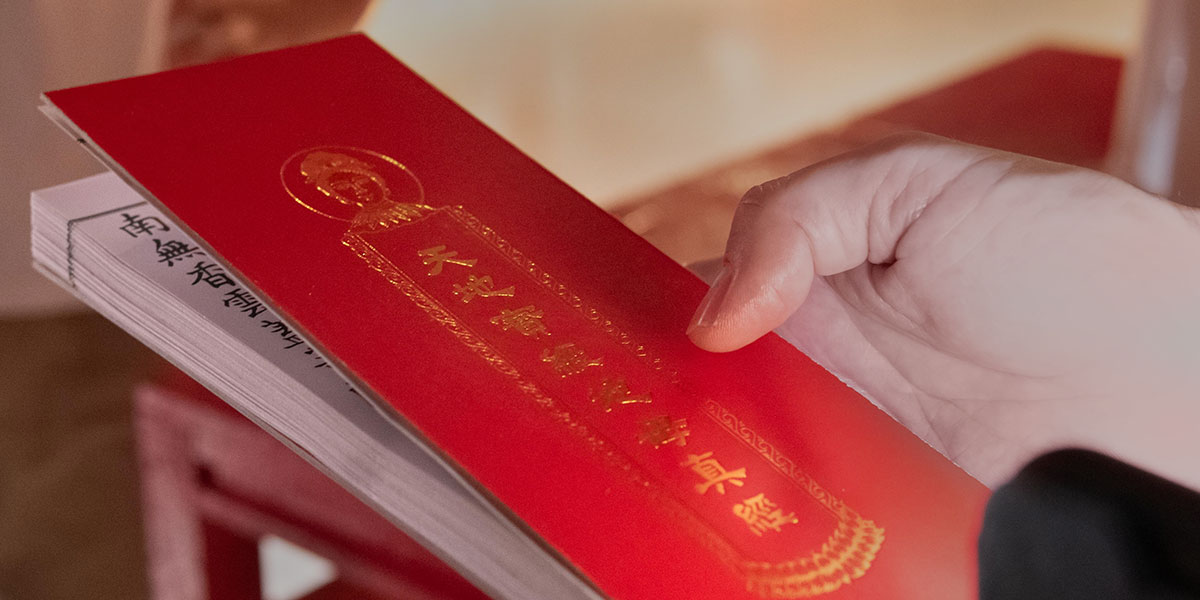Close of up a chat book titled 天地寶經地母真經, Ancient Guanyin Temple (Guanyin gumiao 觀音古廟) (ศาลเจ้ากวนอิม San Tchaw Kuan Im), Thailand. FROGBEAR Cluster 3.4, 2023.
Production and Distribution of Buddhist and Other Religious Texts in Chinese Societies
July 9-10, 2025
Inalco, Paris, France
| Abstracts | Panelists | Schedule | Reports |
This conference is sponsored by the Glorisun Charity Foundation 旭日慈善基金 and the China-Britain Trust for the Promotion of Buddhist Studies 中英佛學促進會, administered by the Glorisun Global Network for Buddhist Studies 旭日全球佛教研究網絡 (https://glorisunglobalnetwork.org) at Peking University (represented by its Research Center for Buddhist Texts and Art 北京大學佛教典籍與藝術研究中心) and at the University of British Columbia (represented by its FROGBEAR project www.frogbear.org), and hosted by the Centre d’études interdisciplinaires sur le bouddhisme (CEIB) and the Institut national des langues et civilisations orientales (Inalco) in Paris, France. It will take place from July 8, 2025 (arrival) to July 11, 2025 (departure) in Inalco.
The study of Chinese religious print culture has only recently emerged as a field and is now thriving, with scholars across the world looking beyond individual publications and into the diverse world of institutions and networks that edited, printed, and disseminated religious books of all kinds from early modern to modern and contemporary times. The study of religious print culture has also been enhanced by recent publications of large reprints collections, as well as by online collaborative projects. Among these, CRTA (Chinese Religious Text Authority 宗教書籍規範索引, https://crta.info) aims to provide an integrated tool for mapping Chinese religious texts, and this conference will feature presentations of the ongoing and future developments of CRTA and related projects.
Among the various topics that have been pursued in recent and ongoing research, we may mention the rise in the nineteenth century of specialized presses (called shanshuju 善書局), publishing a large array religious books; the importance of spirit-writing as a mode of textual production; and the diffusion and reprinting of Chinese religious texts in the whole of East Asia, including Vietnam, Korea, and Japan.
All of these research have shown the deep entanglements of various types of religious institutions and traditions in the publishing world. Buddhist institutions, such as monastic presses (jingfang 經房), have long been major actors, but they have often published books that do not resort to Buddhism narrowly defined, including baojuan 寶卷 narratives and morality books (shanshu 善書). From the late Qing onwards, Christian presses have also become important elements of the religious publishing landscape. Furthermore, many individuals and groups are found involved in the production, printing and circulation of different types of religious groups, associated with different traditions. For these reasons, religious publishing is best studied as a whole rather than divided into “Buddhist”, “Daoist,” etc.
The scope of this conference includes, but is not limited to:
- Religious institutions involved in publishing, from the early phases of print culture to the present
- Local or regional religious printing traditions
- Networks of distribution for religious texts and the economy of religious publishing
- New printing technologies and new formats for religious publishing in the twentieth century, such as journals or textbooks
- New media for disseminating religious texts in contemporary times, such as online publishing
- Genres and typologies of textual production
- Canonization processes and authoritative collections
We are hoping to have presentations dealing with various time periods and areas (including the sinophone world outside of China) as well as religious traditions (Buddhism, Daoism, Confucianism, local cults, sectarian traditions, Islam, Christianity, and more) and genres, from scriptures to narratives, liturgy, ethics, historical records, and more.
The organizing committee cordially invites the submission of papers related to the conference theme. We are now enrolling about 10 scholars from all over the world to join the approximately 25 scholars whose participation has been confirmed. All associated costs, including room and board during the conference, will be covered by the host institutions. Depending on necessity and the availability of funding, some travel cost may also be covered. Please email proposals (1/2 to 1 page) and CVs to frogbear.project@ubc.ca by January 6 (Monday), 2025.
The conference will result in the publication of two collections of papers, one in Chinese and the other in English. Scholars who are confident in completing a draft of their papers by the end of June 2025 and can complete a publishable paper by the middle of October, 2025 are encouraged to apply.
This conference is planned as part of our annual International and Intensive Program on Buddhist Studies.

